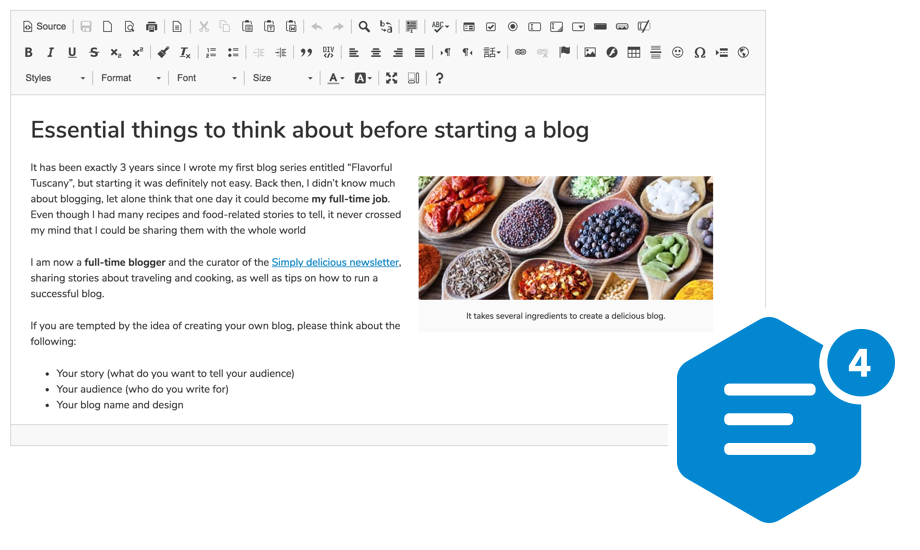CKEditor 4 was launched in 2012 and reached its End of Life (EOL) on June 30, 2023.
A special edition, CKEditor 4 LTS ("Long Term Support"), is available under commercial terms ("Extended Support Model") for anyone looking to extend the coverage of security updates and critical bug fixes.
With CKEditor 4 LTS, security updates and critical bug fixes are guaranteed until December 2026.
Official CKEditor 4 WYSIWYG editor component for Angular.
We are looking forward to your feedback! You can report any issues, ideas or feature requests on the integration issues page.
In order to create an editor instance in Angular, install the ckeditor4-angular npm package as a dependency of your project:
npm install --save ckeditor4-angularAfter installing, import CKEditorModule to your application:
import { CKEditorModule } from 'ckeditor4-angular';
@NgModule( {
imports: [
...
CKEditorModule,
...
],
…
} )You can now use the <ckeditor> tag in the component template to include the rich text editor:
<ckeditor data="<p>Hello, world!</p>"></ckeditor>The data attribute used in the example above is responsible for setting the editor’s data.
See the CKEditor 4 Angular Integration article and Angular examples in the CKEditor 4 documentation.
The CKEditor 4 Angular component works with all the supported browsers except for Internet Explorer 8-10.
The integration can be used together with Angular at version 5.0.0 and higher. It is an implication of Angular metadata produced for this package by the Angular builder. Note that the package.json used in the main repository isn't published on NPM (the production one is present in src/ckeditor/package.json), so there are only a few peer dependencies:
@angular/core>= 5.0.0@angular/common>= 5.0.0@angular/forms>= 5.0.0
required by this package.
Here is how you can contribute to the development of the component. Any feedback and help will be most appreciated!
All issues and feature requests should be reported in the issues section of the official GitHub repository for the CKEditor 4 Angular integration.
Clone the CKEditor 4 Angular integration repository.
Once you have cloned it, install dependencies by running:
npm installThis repository contains the following code:
./src/ckeditorcontains the CKEditor component,./src/appis a demo application using the component.
Run ng serve to start the development server. Navigate to http://localhost:4200/. The app will automatically reload if you change any of the source files.
Run ng build to build the samples. The build artifacts will be stored in the samples/ directory.
Run npm test to execute unit tests via Karma.
There are two options available to alternate the testing process:
url/u- pass custom URL to Karma, for example custom CKEditor 4 build.watch/w- tell Karma to watch for changes.
For example:
npm run test -- -u http://localhost:5000/ckeditor.js -w
Run ng e2e to execute the end-to-end tests via Protractor.
To build and publish the package, run npm run publish.
You can also manually build the package with npm run build-package which will be stored in dist/. Then you can publish it with npm publish dist/.
Copyright (c) 2003-2023, CKSource Holding sp. z o.o. All rights reserved.
Licensed under the terms of any of the following licenses at your choice:
- GNU General Public License Version 2 or later,
- GNU Lesser General Public License Version 2.1 or later,
- Mozilla Public License Version 1.1 or later (the "MPL").
For full details about the license, please check the LICENSE.md file.




